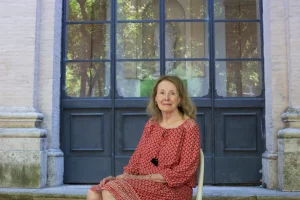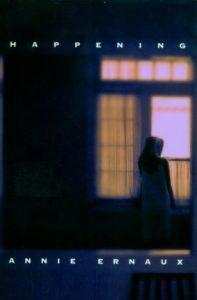Annie Ernaux – “Happening” Review

Annie Ernaux, winner of this year’s Nobel Prize for literature, at a literary festival in Rome in 2016. (Alesia Paradisi/Sipa USA/AP)
Although I had heard of Annie Ernaux (one could hardly live for a decade in France and NOT hear about her), until now I hadn’t read her work. Why not? Well, to be honest I am generally not terribly interested in memoirs of someone’s erotic life, nor of autobiography at all. I rarely find they engage me the way good solid fiction does. However, when a writer wins the Nobel Prize for Literature, the least another writer (and one of far less acclaim) can do is read at least one of the prize-winner’s works.
And so I read Annie Ernaux’s HAPPENING, in which she chronicles her abortion in the 1960s when she was a college student. It is undeniably relevant, since she is writing about a time when abortion in France was illegal. Given what’s happening (pun intended) in the United States these days, the memoir becomes a grim projection of what will happen here in my adopted country should Christian-Taliban politicians take power.
SPOILER ALERT HERE…
With the exception of the gruesome climactic scene and the few pages after it, HAPPENING is written in a distanced, analytical tone. Perhaps this makes the penultimate moment – bloody and screaming and shitting — all the more horrific, surrounded as it is by the cool white walls of French intellectual chill.
 I shall digress for a moment. Years ago a female French artist I knew when I lived in Paris and I were having a coffee and talking about relationships. In frustration with my “American” lack of sophistication (I could never quite get her to understand I was Canadian), she threw her hands up and said, “Oh, you Americans and your Love, Love, Love!! We French understand that love is nothing more than an interesting and entertaining intellectual, psychological exercise! We enjoy it, and the passion it involves, but we don’t wallow in it emotionally they way you do.”
I shall digress for a moment. Years ago a female French artist I knew when I lived in Paris and I were having a coffee and talking about relationships. In frustration with my “American” lack of sophistication (I could never quite get her to understand I was Canadian), she threw her hands up and said, “Oh, you Americans and your Love, Love, Love!! We French understand that love is nothing more than an interesting and entertaining intellectual, psychological exercise! We enjoy it, and the passion it involves, but we don’t wallow in it emotionally they way you do.”
Oh. Huh. (I’m sure many French people will disagree, but she said what she said, so don’t attack me, please!)
I’ve thought about that a lot over the years, the different ways in which different cultures approach love and passion. Certainly my friend’s explanation of the French approach is evident in Ernaux’s work. It is smart. Very. It is clear-eyed. It analyses. It examines. It is dispassionate. Even the passages about sex are clinical. She explains her emotions, but at a remove, and so the reader remains as oddly uninvolved as the memoirist, or at least we do so until the moment when, in the bathroom of her flat, gory life and death combine over the toilet. We are then shocked and helplessly gripped by the unstoppable event.
After nearly dying, Ernaux is taken to a hospital where she is treated with incredible disdain, even cruelty, by a doctor (standing between her legs) who yells, “I’m not a fucking plumber!” when she asks what he’s going to do. He later regrets this not because of how contemptuous and barbaric he was, but because he wouldn’t have treated her that way had he realized she was a college girl, someone of his perceived class.
I couldn’t help but think of the disparities in the American system, how people perceived to be lesser are treated with similar contempt and how it is these women, poor, of color, immigrant, who will be treated the worst should abortions become illegal all over this strange country.
Another digression. I was raped in the mid-70s when I lived briefly in Seattle. I remember being in a hospital examining room with a male doctor between my legs and a room filled, it seems to me now, with other men. Policemen. Hospital staff. Surely there must have been a female nurse there, but I don’t remember one. What I remember is crying out with pain when the doctor did whatever-he-was-doing down there and then hearing him say, “If you’re that tight, I don’t see how you could have been raped.” That shut me up. For years it shut me up.
Note that I say in the above paragraph, “it seems to me now.” I recognize, as does Ernaux, that the past is (as L.P. Hartley wrote) a different country. Not only do they do things differently there, but memory itself is a trickster. We think we remember things as they were, but memory is often at the service of the present moment, confirming today’s perceptions and biases, our immediate fears and beliefs. Still, some things stand out in harsh relief. And this, in the end, is the territory Ernaux is mining: what is memory, what is time, how to our disparate selves exist in that ever-changing stream?
Ernaux crafts superb sentences and has managed to create a scalding experience for readers, in spite of the chilly restraint of her prose, or perhaps not in spite of…. perhaps as a result of that cool-eyed analysis. Happening is also about much more than an abortion. All that in a mere 96 pages. Astonishing.
Another powerful post Lauren. You’ve shared what many of us are thinking … as you so well say ” how people perceived to be lesser are treated with similar contempt and how it is these women, poor, of color, immigrant, who will be treated the worst should abortions become illegal all over this strange country.” I appreciate the way you wove the review of Annie Ernaux’s book together with your own experiences, beautifully done. As always, I admire and value your honesty and ability to address complex issues in a straightforward manner. warm regards, Conny
Dear Lauren, thanks for sharing this. As this post makes clear, we shouldn’t take our rights for granted. We can see there is much at stake for women’s rights over their own body. I hope this mobilizes people to vote! Gratefully, Linda